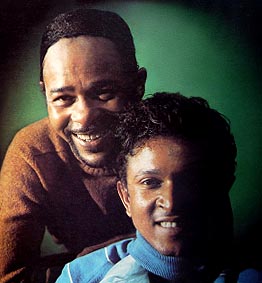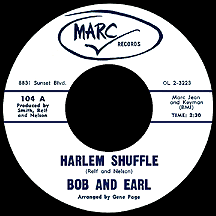BOB AND EARL
Harlem Shuffle
Earl Nelson executed his first great musical feat in 1957 as lead singer of The Hollywood Flames' hit "Buzz-Buzz-Buzz" on Ebb Records. Bobby Day (real name Robert Byrd) had been with the group, earlier named The Hollywood Four Flames, for several years as they had gone from one record label to another, large and small, including Unique, Swing Time, Spin, Lucky, Decca and others. At the time of the Flames' breakthrough hit he had just started as a solo act with Leon Rene's Class label and appeared alongside them on the late-'57 charts with "Little Bitty Pretty One" (the song's backing group, The Satellites, featured more than one moonlighting Hollywood Flame). Single releases on even more labels would be forthcoming, but for the time being success kept Nelson and Day right where they were, sometimes performing live shows in solo, duo and group configurations...all in the same night!
In 1958 after the "Buzz" died down, and several months before Day's million-selling solo smash "Rockin' Robin," the two collaborated at the first of several sessions for Class as Bob and Earl with a remake of the 1947 Frankie Laine hit "That's My Desire." They were having a fine time switching things up for awhile, but by 1960 the duo's efforts had yet to connect and Bobby's solo career was at an impasse, so they split. Ebb had released a nonhit solo single by Earl, "Come On," and the singer spent the first part of the new decade without a foothold, until he and Bobby Relf, who'd also put in time as a member of the Hollywood Flames and in a group called The Laurels, revived the Bob and Earl act. Relf, in fact, had performed under several pseudonyms up to that point in addition to his own name on a single for Cash Records. The next few years would be less confusing for all involved, at least as far as names, both real and fabricated, went.
The new Bob and Earl hit the charts in October 1962 with "Don't Ever Leave Me" on the tiny Tempe label. Fred Smith, best known as a writer and producer (with Cliff Goldsmith) for long-running L.A. R&B group The Olympics, produced the session, an emotional, gospel-flavored shot of soul. The record was nothing like the singles they'd done in the '50s and deserved to be bigger than it was. Airplay was strong in some regions, but the single fell off the national charts in November.
In 1963, a teenage songwriter-musician named Barry Eugene Carter was released from a four month jail term for petty theft. His big break in the biz came soon after when he played piano on Bob and Earl's "Harlem Shuffle," with Smith producing an arrangement by Gene Page (in the 1970s, when Carter became famous as singer Barry White, he and Page worked together on a lengthy string of sexually-charged hits). The track had all the right elements in a perfect synergy: a commanding brass section throughout and strong, confident vocals. The singers' self-penned lyrics were no more than shout-outs to other dance hits of the day ("Monkey Time," "Hitch Hike," "Shake a Tail Feather"), but the production demanded attention; what could have been a standard dance tune was dynamite in the hands of this crew.

Released on L.A.'s Marc label near the end of the year, the record was only a mid-chart Hot 100 performer (though much bigger in the R&B market, making the top ten in January 1964). Relf and Nelson toured and made TV appearances to milk the most they could out of what was (and would remain) their biggest hit, following up with the soundalike "Puppet on a String." Good track, added organ riff, but otherwise too much like the previous to gain much traction. The guys hung in there, continued recording under the guidance of Smith and Page, and had a pair of sizeable hits in 1966 on the Mirwood label. Earl went top 20 pop early in the year with a dance track, "The Duck," using the alias Jackie Lee. Bob and Earl returned to the R&B charts that summer with "Baby, It's Over," an answer of sorts to "Don't Ever Leave Me" with a spoken passage similar to the musings that were Joe Tex's trademark. The act performed together for several more years before calling it quits.
"Harlem Shuffle," it turns out, has taken on a life of its own as fans and musicians have discovered this semi-hidden gem throughout the years. Wayne Cochran waxed a wild rendition in 1965 and Roy Head's backing band The Traits made a chart appearance with the song a year later. Bob and Earl's original finally caught on in England in the spring of 1969, hitting top ten and giving the duo an opportunity to electrify European audiences. The Rolling Stones, fans from the beginning, paid tribute with their own version, a top ten U.S. hit in the spring of 1986. Irish-American Los Angeles-based rap group House of Pain spliced the now-classic horn intro, intact, onto the beginning of their million-selling 1992 hit "Jump Around."


